From Wikipedia, the free encyclopedia
Blogger Ref Ling http://www.p2pfoundation.net/Multi-Dimensional_Science
Blogger Ref Ling http://www.p2pfoundation.net/Multi-Dimensional_Science
For other uses, see Paradiso.
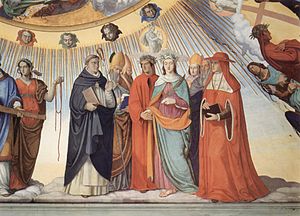
Dante and Beatrice speak to the teachers of wisdom Thomas Aquinas, Albertus Magnus, Peter Lombard and Sigier of Brabant in the Sphere of the Sun (fresco by Philipp Veit), Canto 10.
| This article is part of a series about Dante's Divine Comedy | |
|---|---|
| Inferno · Purgatorio · Paradiso | |
Contents
- 1 Introduction
- 2 The Spheres of Heaven
- 2.1 First Sphere (The Moon: The Inconstant)
- 2.2 Second Sphere (Mercury: The Ambitious)
- 2.3 Third Sphere (Venus: The Lovers)
- 2.4 Fourth Sphere (The Sun: The Wise)
- 2.5 Fifth Sphere (Mars: The Warriors of the Faith)
- 2.6 Sixth Sphere (Jupiter: The Just Rulers)
- 2.7 Seventh Sphere (Saturn: The Contemplatives)
- 2.8 Eighth Sphere (The Fixed Stars: Faith, Hope, and Love)
- 2.9 Ninth Sphere (The Primum Mobile: The Angels)
- 3 The Empyrean
- 4 See also
- 5 Footnotes
- 6 External links
Introduction[edit]
During the course of his journey, Dante meets and converses with several blessed souls. He is careful to say that these all actually live in bliss with God in the Empyrean:
"But all those souls grace the Empyrean;However, for Dante's benefit (and the benefit of his readers), he is "as a sign"[3] shown various souls in planetary and stellar spheres that have some appropriate connotation.
and each of them has gentle life though some
sense the Eternal Spirit more, some less."[2]
While the structures of the Inferno and Purgatorio were based around different classifications of sin, the structure of the Paradiso is based on the four cardinal virtues (Prudence, Justice, Temperance, and Fortitude) and the three theological virtues (Faith, Hope, and Love).
The Spheres of Heaven[edit]
First Sphere (The Moon: The Inconstant)[edit]
On visiting the Moon, Beatrice explains to Dante the reasons for the markings on its surface, describing a simple scientific experiment in optics. She also praises the experimental method in general (Canto II):"Yet an experiment, were you to try it,
could free you from your cavil, and the source
of your arts' course springs from experiment."[4]
"for will, if it resists, is never spent,Beatrice explains that a vow is a pact "drawn between a man / and God,"[8] in which a person freely offers up his free will as a gift to God. Vows should therefore not be taken lightly, and should be kept once given – unless keeping the vow would be a greater evil, as with Jephthah's and Agamemnon's sacrifice of their daughters (Canto V).[9]
but acts as nature acts when fire ascends,
though force a thousand times tries to compel.
So that, when will has yielded much or little,
it has abetted force as these souls did:
they could have fled back to their holy shelter."[7]
Second Sphere (Mercury: The Ambitious)[edit]
Because of its proximity to the sun, the planet Mercury is often difficult to see. Allegorically, the planet represents those who did good out of a desire for fame, but who, being ambitious, were deficient in the virtue of justice. Their earthly glory pales into insignificance beside the glory of God, just as Mercury pales into insignificance beside the sun.[9] Here Dante meets the Emperor Justinian, who introduces himself with the words "Caesar I was and am Justinian,"[10] indicating that his personality remains, but that his earthly status no longer exists in Heaven[11] (Canto V). Justinian recounts the history of the Roman Empire, mentioning, among others, Julius Caesar and Cleopatra; and bemoans the present state of Italy, given the conflict between Guelphs and Ghibellines, and the involvement of the "yellow lilies" of France[11] (Canto VI):"For some oppose the universal emblemBy association, Beatrice discourses on the Incarnation and the Crucifixion of Christ, which occurred during Roman times (Canto VII).
with yellow lilies; others claim that emblem
for party: it is hard to see who is worse.
Let Ghibellines pursue their undertakings
beneath another sign, for those who sever
this sign and justice are bad followers."[12]
Third Sphere (Venus: The Lovers)[edit]
The planet Venus (the Morning and Evening Star) is traditionally associated with the Goddess of Love, and so Dante makes this the planet of the lovers, who were deficient in the virtue of temperance (Canto VIII):"The world, when still in peril, thought that, wheeling,
in the third epicycle, Cyprian
the fair sent down her rays of frenzied love,
.. and gave the name of her
with whom I have begun this canto, to
the planet that is courted by the sun,
at times behind her and at times in front."[13]
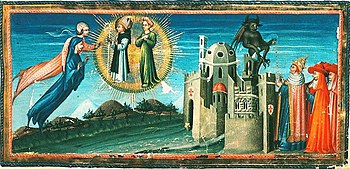
Folquet de Marseilles bemoans the corruption of the Church, with the clergy receiving money from Satan (miniature by Giovanni di Paolo), Canto 9.
The troubadour Folquet de Marseilles speaks of the temptations of love, and points out that (as was believed at the time) the cone of the Earth's shadow just touches the sphere of Venus. He condemns the city of Florence (planted, he says, by Satan) for producing that "damned flower" (the florin) which is responsible for the corruption of the Church, and he criticises the clergy for their focus on money, rather than on Scripture and the writings of the Church Fathers (Canto IX):
"Your city, which was planted by that one
who was the first to turn against his Maker,
the one whose envy cost us many tears
produces and distributes the damned flower
that turns both sheep and lambs from the true course,
for of the shepherd it has made a wolf.
For this the Gospel and the great Church Fathers
are set aside and only the Decretals
are studied as their margins clearly show.
On these the pope and cardinals are intent.
Their thoughts are never bent on Nazareth,
where Gabriel's open wings were reverent."[16]
Fourth Sphere (The Sun: The Wise)[edit]
Beyond the shadow of the Earth, Dante deals with positive examples of Prudence, Justice, Temperance, and Fortitude. Within the Sun, which is the Earth's source of illumination, Dante meets the greatest examples of prudence: the souls of the wise, who help to illuminate the world intellectually[17] (Canto X). Initially, a circle of twelve bright lights dance around Dante and Beatrice. These are the souls of:[17]
Dante and Beatrice meet twelve wise men in the Sphere of the Sun (miniature by Giovanni di Paolo), Canto 10.
- Thomas Aquinas
- Albertus Magnus
- Gratian
- Peter Lombard
- King Solomon
- Dionysius the Areopagite, confused here with Pseudo-Dionysius
- Orosius
- Boethius
- Isidore of Seville
- Bede
- Richard of Saint Victor
- Siger of Brabant
"Between Topino's stream and that which flowsTwelve new bright lights appear, one of which is St. Bonaventure, a Franciscan, who recounts the life of St. Dominic, founder of the order to which Aquinas belonged. The two orders were not always friendly on earth, and having members of one order praising the founder of the other shows the love present in Heaven[19] (Canto XII). The twenty-four bright lights revolve around Dante and Beatrice, singing of the Trinity, and Aquinas explains the surprising presence of King Solomon, who is placed here for kingly, rather than philosophical or mathematical wisdom (Cantos XIII and XIV):
down from the hill the blessed Ubaldo chose,
from a high peak there hangs a fertile slope;
from there Perugia feels both heat and cold
at Porta Sole, while behind it sorrow
Nocera and Gualdo under their hard yoke.
From this hillside, where it abates its rise,
a sun was born into the world, much like
this sun when it is climbing from the Ganges.
Therefore let him who names this site not say
Ascesi, which would be to say too little,
but Orient, if he would name it rightly."[18]
"My words did not prevent your seeing clearly
that it was as a king that he had asked
for wisdom that would serve his royal task
and not to know the number of the angels
on high or, if combined with a contingent,
necesse ever can produce necesse,
or si est dare primum motum esse,
or if, within a semicircle, one
can draw a triangle with no right angle."[20]
Fifth Sphere (Mars: The Warriors of the Faith)[edit]
The planet Mars is traditionally associated with the God of War, and so Dante makes this planet the home of the warriors of the Faith, who gave their lives for God, thereby displaying the virtue of fortitude.[21] The millions of sparks of light that are the souls of these warriors form a Greek cross on the planet Mars, and Dante compares this cross to the Milky Way (Canto XIV):"As, graced with lesser and with larger lightsDante says that sages are "perplexed" by the nature of the Milky Way, but in his Convivio, he had described its nature fairly well:
between the poles of the world, the Galaxy
gleams so that even sages are perplexed;
so, constellated in the depth of Mars,
those rays described the venerable sign
a circle's quadrants form where they are joined."[22]
"What Aristotle said on this matter cannot be known with certainty.. In the Old Translation he says that the Galaxy is nothing but a multitude of fixed stars in that region, so small that we are unable to distinguish them from here below, though from them originates the appearance of that brightness which we call the Galaxy; this may be so, for the heaven in that region is denser, and therefore retains and throws back this light. Avicenna and Ptolemy seem to share this opinion with Aristotle."[23]Dante meets his ancestor Cacciaguida, who served in the Second Crusade.[24] Cacciaguida praises the twelfth-century Republic of Florence, and bemoans the way in which the city has declined since those days (Cantos XV and XVI). The setting of the Divine Comedy in the year 1300, before Dante's exile, has allowed characters in the poem to "foretell" bad things for Dante.[25] In response to a question from Dante, Cacciaguida speaks the truth bluntly. Dante will be exiled (Canto XVII):
"You shall leave everything you love most dearly:However, Cacciaguida also charges Dante to write and tell the world all that he has seen of Hell, Purgatory, and Heaven.[25] Finally, Dante sees some other warriors of the Faith, such as Joshua, Judas Maccabeus, Charlemagne, Roland, and Godfrey of Bouillon (Canto XVIII).
this is the arrow that the bow of exile
shoots first. You are to know the bitter taste
of others' bread, how salt it is, and know
how hard a path it is for one who goes
descending and ascending others' stairs."[26]
Sixth Sphere (Jupiter: The Just Rulers)[edit]
"DILIGITE IUSTITIAM were the verbPresent in this sphere are David, Hezekiah, Trajan (converted to Christianity according to a medieval legend), Constantine, William II of Sicily, and (to Dante's amazement) Ripheus the Trojan, a pagan saved by the mercy of God.[29] The souls forming the imperial eagle speak with one voice, and tell of God's justice[30] (Cantos XIX and XX).
and noun that first appeared in that depiction;
QUI IUDICATIS TERRAM followed after.
Then, having formed the M of the fifth word,
those spirits kept their order; Jupiter's
silver, at that point, seemed embossed with gold."[28]
Seventh Sphere (Saturn: The Contemplatives)[edit]
The sphere of Saturn is that of the contemplatives, who embody temperance.[31] Dante here meets Peter Damian, and discusses with him monasticism, the doctrine of predestination, and the sad state of the Church[32] (Cantos XXI and XXII). Beatrice, who represents theology, becomes increasingly lovely here, indicating the contemplative's closer insight into the truth of God: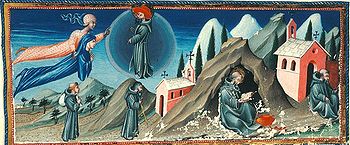
Dante and Beatrice meet Peter Damien, who tells of his life, and discusses predestination (miniature by Giovanni di Paolo), Canto 21.
"She did not smile. Instead her speech to me
began: Were I to smile, then you would be
like Semele when she was turned to ashes,
because, as you have seen, my loveliness
which, even as we climb the steps of this
eternal palace, blazes with more brightness
were it not tempered here, would be so brilliant
that, as it flashed, your mortal faculty
would seem a branch a lightning bolt has cracked."[33]

Looking down from the Sphere of the Fixed Stars, Dante sees the humble planet that is the Earth, Canto 22.
Eighth Sphere (The Fixed Stars: Faith, Hope, and Love)[edit]
The sphere of the Fixed Stars is the sphere of the church triumphant.[34] From here (in fact, from the constellation Gemini, under which he was born), Dante looks back on the seven spheres he has visited, and on the Earth (Canto XXII):"My eyes returned through all the seven spheresHere, Dante sees the Virgin Mary and other saints (Canto XXIII). St. Peter tests Dante on faith, asking what it is, and whether Dante has it. In response to Dante's reply, St. Peter asks Dante how he knows that the Bible is true, and (in an argument attributed to Augustine[36]) Dante cites the miracle of the Church's growth from such humble beginnings (Canto XXIV):
and saw this globe in such a way that I
smiled at its scrawny image: I approve
that judgment as the best, which holds this earth
to be the least; and he whose thoughts are set
elsewhere, can truly be called virtuous."[35]
"Say, who assures you that those works were real?St. James[38] questions Dante on hope, and Beatrice vouches for his possession of it (Canto XXV):
came the reply. The very thing that needs
proof no thing else attests these works to you.
I said: If without miracles the world
Problems playing this file? See media help.
was turned to Christianity, that is
so great a miracle that, all the rest
are not its hundredth part: for you were poor
and hungry when you found the field and sowed
the good plant once a vine and now a thorn."[37]
"There is no child of the Church MilitantFinally, St. John questions Dante on love. In his reply, Dante refers back to the concept of "twisted love" discussed in the Purgatorio[40] (Canto XXVI):
who has more hope than he has, as is written
within the Sun whose rays reach all our ranks:
thus it is granted him to come from Egypt
into Jerusalem that he have vision
of it, before his term of warring ends."[39]
"Thus I began again: My charitySt. Peter then denounces Pope Boniface VIII in very strong terms, and says that, in his eyes, the Papal See stands empty (Canto XXVII).
results from all those things whose bite can bring
the heart to turn to God; the world's existence
and mine, the death that He sustained that I
might live, and that which is the hope of all
believers, as it is my hope, together
with living knowledge I have spoken of
these drew me from the sea of twisted love
and set me on the shore of the right love.
The leaves enleaving all the garden of
the Everlasting Gardener, I love
according to the good He gave to them."[41]
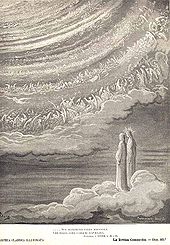
Dante and Beatrice see God as a point of light surrounded by angels (illustration by Gustave Doré), Canto 28.
Ninth Sphere (The Primum Mobile: The Angels)[edit]
The Primum Mobile ("first moved" sphere) is the last sphere of the physical universe. It is moved directly by God, and its motion causes all the spheres it encloses to move[42] (Canto XXVII):"This heaven has no other where than this:The Primum Mobile is the abode of angels, and here Dante sees God as an intensely bright point of light surrounded by nine rings of angels (Canto XXVIII). Beatrice explains the creation of the universe, and the role of the angels, ending with a forceful criticism of the preachers of the day (Canto XXIX):
the mind of God, in which are kindled both
the love that turns it and the force it rains.
As in a circle, light and love enclose it,
as it surrounds the rest and that enclosing,
only He who encloses understands.
No other heaven measures this sphere's motion,
but it serves as the measure for the rest,
even as half and fifth determine ten;"[43]

Beatrice criticises the preachers of the day, suggesting that a sinister "bird" (a winged demon) nests in the preacher's cowl (miniature by Giovanni di Paolo), Canto 29.
"Christ did not say to his first company:
'Go, and preach idle stories to the world;
but he gave them the teaching that is truth,
and truth alone was sounded when they spoke;
and thus, to battle to enkindle faith,
the Gospels served them as both shield and lance.
But now men go to preach with jests and jeers,
and just as long as they can raise a laugh,
the cowl puffs up, and nothing more is asked.
But such a bird nests in that cowl, that if
the people saw it, they would recognize
as lies the pardons in which they confide."[44]
The Empyrean[edit]
From the Primum Mobile, Dante ascends to a region beyond physical existence, the Empyrean, which is the abode of God. Beatrice, representing theology,[45] is here transformed to be more beautiful than ever before, and Dante becomes enveloped in light, rendering him fit to see God[45] (Canto XXX):"Like sudden lightning scattering the spiritsDante sees an enormous rose, symbolising divine love,[45] the petals of which are the enthroned souls of the faithful (both those of the Old Testament and those of the New). All the souls he has met in Heaven, including Beatrice, have their home in this rose.[45] Angels fly around the rose like bees, distributing peace and love. Beatrice now returns to her place in the rose, signifying that Dante has passed beyond theology in directly contemplating God,[47] and St. Bernard, as a mystical contemplative, now guides Dante further (Canto XXXI).
of sight so that the eye is then too weak
to act on other things it would perceive,
such was the living light encircling me,
leaving me so enveloped by its veil
of radiance that I could see no thing.
The Love that calms this heaven always welcomes
into Itself with such a salutation,
to make the candle ready for its flame."[46]
"but through my sight, which as I gazed grew stronger,Within these circles Dante can discern the human form of Christ. The Divine Comedy ends with Dante trying to understand how the circles fit together, and how the humanity of Christ relates to the divinity of the Son but, as Dante puts it, "that was not a flight for my wings."[50] In a flash of understanding, which he cannot express, Dante does finally see this, and his soul becomes aligned with God's love:[48]
that sole appearance, even as I altered,
seemed to be changing. In the deep and bright
essence of that exalted Light, three circles
appeared to me; they had three different colors,
but all of them were of the same dimension;
one circle seemed reflected by the second,
as rainbow is by rainbow, and the third
seemed fire breathed equally by those two circles."[49]
"But already my desire and my will
were being turned like a wheel, all at one speed,
by the Love which moves the sun and the other stars."[51]
See also[edit]
- Divine Comedy
- Inferno
- Purgatorio
- Theological virtues
- Allegory in the Middle Ages
- Dante and his Divine Comedy in popular culture
- List of cultural references in The Divine Comedy
Footnotes[edit]
- ^ C. S. Lewis, The Discarded Image: An Introduction to Medieval and Renaissance Literature, Chapter V, Cambridge University Press, 1964.
- ^ Paradiso, Canto IV, lines 34–36, Mandelbaum translation.
- ^ Paradiso, Canto IV, line 38, Mandelbaum translation.
- ^ Paradiso, Canto II, lines 94–96, Mandelbaum translation.
- ^ Dorothy L. Sayers, Paradise, notes on Canto II.
- ^ Dorothy L. Sayers, Paradise, notes on Canto III.
- ^ Paradiso, Canto IV, lines 76–81, Mandelbaum translation.
- ^ Paradiso, Canto V, lines 28–29, Mandelbaum translation.
- ^ a b Dorothy L. Sayers, Paradise, notes on Canto V.
- ^ Paradiso, Canto VI, line 10, Mandelbaum translation.
- ^ a b Dorothy L. Sayers, Paradise, notes on Canto VI.
- ^ Paradiso, Canto VI, lines 76–81, Mandelbaum translation.
- ^ Paradiso, Canto VIII, lines 1–3, 9–12, Mandelbaum translation.
- ^ Dorothy L. Sayers, Paradise, notes on Canto VIII.
- ^ Inferno, Canto XII, line 109, Mandelbaum translation: "That brow with hair so black is Ezzelino."
- ^ Paradiso, Canto IX, lines 127–138, Mandelbaum translation.
- ^ a b Dorothy L. Sayers, Paradise, notes on Canto X.
- ^ Paradiso, Canto XI, lines 43–54, Mandelbaum translation.
- ^ Dorothy L. Sayers, Paradise, notes on Canto XI.
- ^ Paradiso, Canto XIII, lines 94–102, Mandelbaum translation.
- ^ Dorothy L. Sayers, Paradise, notes on Canto XIV.
- ^ Paradiso, Canto XIV, lines 97–102, Mandelbaum translation.
- ^ Dante Alighieri, Convivio, Book II, Chapter 14, Richard Lansing translation.
- ^ Dorothy L. Sayers, Paradise, notes on Canto XV.
- ^ a b Dorothy L. Sayers, Paradise, notes on Canto XVII.
- ^ Paradiso, Canto XVII, lines 55–60, Mandelbaum translation.
- ^ a b Dorothy L. Sayers, Paradise, notes on Canto XVIII.
- ^ Paradiso, Canto XVIII, lines 91–96, Mandelbaum translation.
- ^ Dorothy L. Sayers, Paradise, notes on Canto XX.
- ^ Dorothy L. Sayers, Paradise, notes on Canto XIX.
- ^ Dorothy L. Sayers, Paradise, notes on Canto XXI.
- ^ Dorothy L. Sayers, Paradise, notes on Canto XXII.
- ^ Paradiso, Canto XXI, lines 4–12, Mandelbaum translation.
- ^ Dorothy L. Sayers, Paradise, notes on Canto XXIII.
- ^ Paradiso, Canto XXII, lines 133–138, Mandelbaum translation.
- ^ Dorothy L. Sayers, Paradise, notes on Canto XXIV.
- ^ Paradiso, Canto XXIV, lines 103–111, Mandelbaum translation.
- ^ Dorothy L. Sayers, Paradise, notes on Canto XXV.
- ^ Paradiso, Canto XXV, lines 52–57, Mandelbaum translation.
- ^ Dorothy L. Sayers, Paradise, notes on Canto XXVI.
- ^ Paradiso, Canto XXVI, lines 55–56, Mandelbaum translation.
- ^ Dorothy L. Sayers, Paradise, notes on Canto XXVII.
- ^ Paradiso, Canto XXVII, lines 109–117, Mandelbaum translation.
- ^ Paradiso, Canto XXIX, lines 109–120, Mandelbaum translation.
- ^ a b c d Dorothy L. Sayers, Paradise, notes on Canto XXX.
- ^ Paradiso, Canto XXX, lines 46–54, Mandelbaum translation.
- ^ Dorothy L. Sayers, Paradise, notes on Canto XXXI.
- ^ a b Dorothy L. Sayers, Paradise, notes on Canto XXXIII.
- ^ Paradiso, Canto XXXIII, lines 112–120, Mandelbaum translation.
- ^ Paradiso, Canto XXXIII, line 139, C. H. Sisson translation.
- ^ Paradiso, Canto XXXIII, lines 142-145, C. H. Sisson translation.
External links[edit]
| Wikimedia Commons has media related to Paradiso. |
| Wikisource has original text related to this article: |
- World of Dante Multimedia website that offers Italian text of Divine Comedy, Allen Mandelbaum's translation, gallery, interactive maps, timeline, musical recordings, and searchable database for students and teachers by Deborah Parker and IATH (Institute for Advanced Technologies in the Humanities) of the University of Virginia
- Princeton Dante Project Website that offers the complete text of the Divine Comedy (and Dante's other works) in Italian and English along with audio accompaniment in both languages. Includes historical and interpretive annotation.
- Dante Dartmouth Project: Full text of more than 70 Italian, Latin, and English commentaries on the Commedia, ranging in date from 1322 (Iacopo Alighieri) to the 2000s (Robert Hollander)
- Dante's Divine Comedy presented by the Electronic Literature Foundation. Multiple editions, with Italian and English facing page and interpolated versions.
- The Comedy in English: trans. Cary (with Doré's illustrations) (zipped HTML downloadable from Project Gutenberg), Cary/Longfellow/Mandelbaum parallel edition
- On-line Concordance to the Divine Comedy
- Audiobooks: Public domain recordings from LibriVox (in Italian, Longfellow translation); some additional recordings
- Danteworlds, multimedia presentation of the Divine Comedy for students by Guy Raffa of the University of Texas
- Dante's Places: a map (still a prototype) of the places named by Dante in the Commedia, created with GoogleMaps. An explanatory PDF is available for download at the same page
- Gustave Dore - Paradiso Complete 18 hi-res pics album
| ||||||||||||||||||||||||||






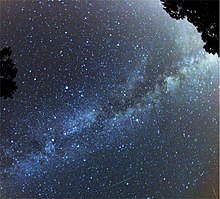



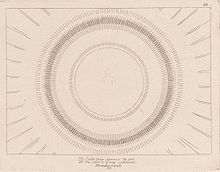
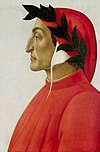

No comments:
Post a Comment